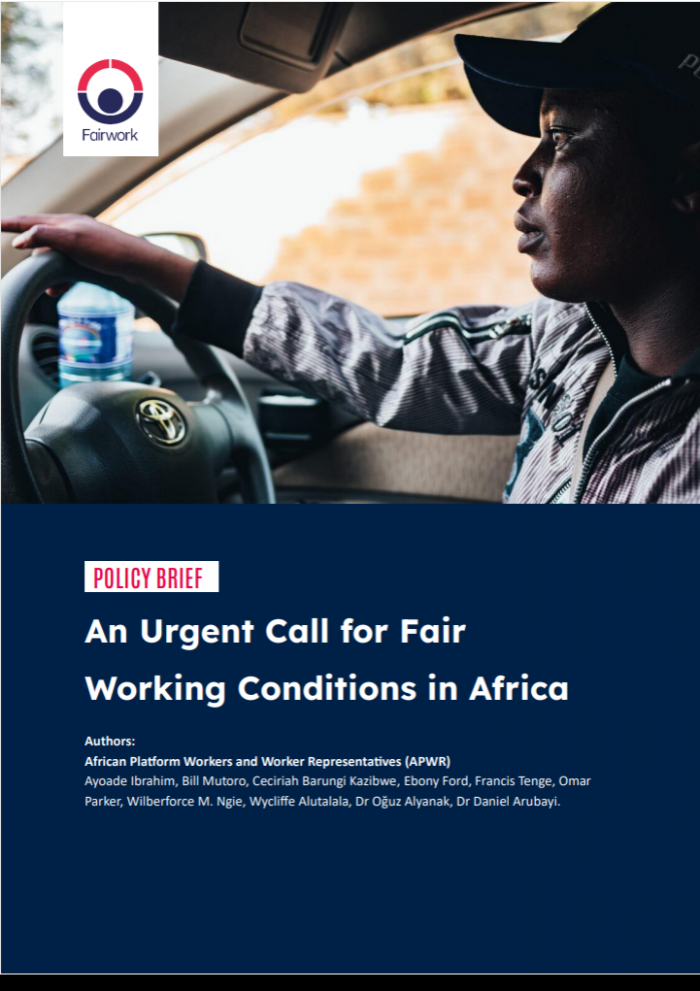

A new economy based on digital platforms has gained popularity in recent times. Known as the platform economy, platforms Uber, Glovo, and Jumia Food are among the companies that are building online frameworks that permit a wide range of platform-mediated work activities. This paves the way for significant shifts in how we work, generate economic value, and compete for the profits that ensue.
The Fairwork project, established in 2018 by the Oxford Internet Institute and supported by the Federal Ministry for Economic Cooperation and Development (BMZ), emphasizes the best and worst practices of gig platforms in order to create a more equitable digital platform economy.
The 2022 Fairwork Scores for Ghana range from zero to five (out of ten), showing the spread in working conditions on the ten digital labour platforms analysed. These varying scores reflect the policies and management practices the platforms have in place. The Black Ride and Glovo top the list of platforms studied this year, with five points.
Fairwork Ghana has prepared a booklet of best practices which highlights good practices of platforms in Ghana across the two years of scoring. These examples of good platform policies show that it is possible for transportation and delivery platforms to offer decent working conditions.
Unions and workers’ associations play a crucial role in negotiating for better pay and working conditions. There are many unions and workers’ associations for ride-hailing and delivery workers in Ghana. This flyer explains why they are important and why you should join one!
Want to stay up to date? Follow us on social media and sign up for our newsletter!
After engaging with Fairwork over the past year, several platforms have made changes to their platform policies in order to advance fairer working conditions for their workers on the principles outlined below:
Fair contracts: Glovo, a Spanish food delivery company has amended its Terms and Conditions that govern its contractual relationship with platform workers in Ghana, to change the contract to be subject to Ghanaian law (as opposed to Spanish law, as it was previously). This policy change was part of the evidence that allowed us to award Glovo with a point for Criterion 3.1 under Principle 3 on ‘Fair Contracts’. Glovo’s total score for this year in Ghana is 5 out of 10.
Fair Management: Eziban, a Ghanaian food delivery company, has drafted and committed to an anti-discrimination policy, and additionally outlined its commitment to investigating and dismantling barriers to equal participation on the platform for under-represented or disadvantaged groups in Ghana. This policy change was part of the evidence that allowed us to award Eziban with a point for Criterion 4.2 under Principle 4 on ‘Fair Management’. Eziban’s total score for this year in Ghana is 6 out of 10.
Fair Representation: Eziban has additionally released a public statement confirming their willingness to engage in collective bargaining. This policy change was part of the evidence that allowed us to award Eziban with a point for Criterion 5.1 under Principle 5 on ‘Fair Representation’.
Webinar: Fairwork Ghana Ratings 2021 Report Launch
Two of the core members for the Fairwork team in Ghana Prof Richard Boateng and Prof Thomas Anning-Dorson present key findings from the report. This is followed by a discussion with guest panellists which includes driver union leaders, representatives from the labour department in Ghana and a legal practitioner. The webinar was organised by the Oxford Internet Institute at the University of Oxford, in collaboration with the WZB Berlin Social Science Centre, the University of Ghana, and the Ghana Institute of Management and Public Administration. The session was moderated by Dr Joseph Budu, also a member of the Ghana Fairwork team.
University of Ghana Business School (Date: 02 – Dec 2021) – Fairwork Ghana Launches Digital Platform Report at UGBS
Graphic Online (Date: 25 – Nov 2021) – Fairwork to launch report on working conditions of Ghana’s digital labour platforms